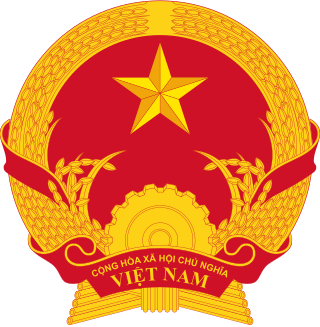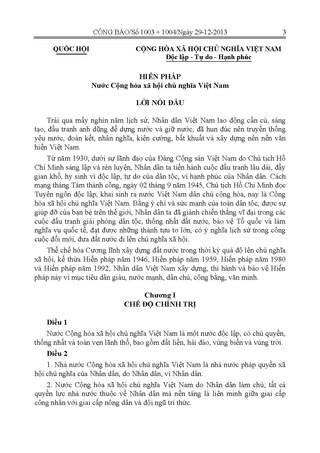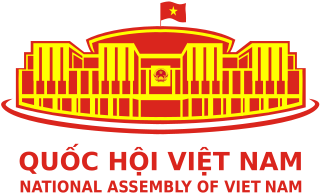
The Supreme Soviet of the Union of Soviet Socialist Republics was, beginning in 1936, the highest body of state authority of the Union of Soviet Socialist Republics (USSR), and based on the principle of unified power was the only branch of government in the Soviet state. Prior to 1936, the Congress of Soviets was the supreme legislative body. During 1989–1991 a similar, but not identical structure was the supreme legislative body. The Supreme Soviet appointed the Council of Ministers, the Supreme Court, and the Procurator General of the USSR as well as elected the Presidium which served as the USSR's collective head of state by the both 1936 and 1977 Soviet Constitution.

The politics of Vietnam is dominated by a single party under an authoritarian system, the Communist Party of Vietnam (CPV). The President of Vietnam is the head of state, and the Prime Minister of Vietnam is the head of government, both of these are separate from the General Secretary of the Communist Party of Vietnam who leads the CPV and is head of the Politburo and the Central Military Commission, thus the General Secretary is the de facto supreme leader of Vietnam. Executive power is exercised by the government and the President of Vietnam. Legislative power is vested in the National Assembly of Vietnam. The Judiciary is independent of the executive. The parliament adopted the current Constitution of Vietnam, its fifth, on 28 November 2013.

The National Assembly was the authoritative legislative body of the Republic of China, from 1947 to 2005. Along with the Control Yuan and the Legislative Yuan, the National Assembly formed the tricameral parliament of the Republic of China.
A communist state is a form of government that combines the state leadership of a communist party, Marxist–Leninist political philosophy, and an official commitment to the construction of a communist society. Communism in its modern form grew out of the socialist movement in 19th-century Europe and blamed capitalism for societal miseries. In the 20th century, several communist states were established, first in Russia with the Russian Revolution of 1917 and then in portions of Eastern Europe, Asia, and a few other regions after World War II. The institutions of these states were heavily influenced by the writings of Karl Marx, Friedrich Engels, Vladimir Lenin, Joseph Stalin and others. However, the political reforms of Soviet leader Mikhail Gorbachev known as Perestroika and socio-economic difficulties produced the revolutions of 1989, which brought down all the communist states of the Eastern Bloc bar the Soviet Union. The repercussions of the collapse of these states contributed to political transformations in the Soviet Union and Yugoslavia and several other non-European communist states. Presently, there are five communist states in the world: China, Cuba, Laos, North Korea and Vietnam.
The 1977 Constitution of the Soviet Union, officially the Constitution of the Union of Soviet Socialist Republics, was the constitution of the Soviet Union adopted on 7 October 1977.

The president of the Socialist Republic of Vietnam is the head of state of Vietnam, elected by the Vietnam National Assembly from delegates of the National Assembly. Since Vietnam is a single-party state, the president is generally considered to hold the second highest position in the political system, formally after the general secretary of the Communist Party of Vietnam. In addition, the president appoints the head of government, the prime minister. As head of state, the President represents Vietnam both domestically and internationally, and maintains the regular and coordinated operation and stability of the national government and safeguards the independence and territorial integrity of the country.
The Congress of Soviets was the supreme governing body of the Russian Soviet Federative Socialist Republic and several other Soviet republics from 1917 to 1936 and a somewhat similar Congress of People's Deputies from 1989 to 1991. After the creation of the Soviet Union, the Congress of Soviets of the Soviet Union functioned as its legislative branch until its dissolution in 1936. Its initial full name was the "Congress of Soviets of Workers', Soldiers' and Peasants' Deputies". It was also sometimes known as the "Congress of People's Deputies." A similar name also applied in communist-held China in the Republican era.

The Vietnamese Constitution or the Constitution of Vietnam, fully the Constitution of the Socialist Republic of Vietnam, is the fundamental and supreme law of the Socialist Republic of Vietnam. The current constitution was adopted on November 28, 2013, by the Thirteenth National Assembly and took effect on January 1, 2014, being the third constitutions adopted by the Vietnamese state since the political reunification of the country in 1976.

The political system of the Soviet Union took place in a federal single-party soviet socialist republic framework which was characterized by the superior role of the Communist Party of the Soviet Union (CPSU), the only party permitted by the Constitution.

The National Assembly of the Socialist Republic of Vietnam is the parliament and the highest body of state power of Vietnam. The National Assembly is the only branch of government in Vietnam and, in accordance with the principle of unified power, all state organs are subservient to it.

The Great National Assembly was the supreme body of state power of the Socialist Republic of Romania. The Great National Assembly was the only branch of government in Romania, and per the principle of unified power, all state organs were subservient to it. After the overthrow of Communism in Romania in December 1989, the Great National Assembly was dissolved by decree of the National Salvation Front (FSN) and eventually replaced by the bicameral parliament, made up of the Chamber of Deputies and the Senate.
Civilian control of the military in communist states have differed from country to country. There are typically three models of civilian control of the military: party-run, state-run, and hybrid. In all three models, the communist party has an internal organisation in the military.

The Supreme Soviet of the Russian SFSR, later Supreme Soviet of the Russian Federation, was the supreme government institution of the Russian SFSR in 1938–1990; in 1990–1993 it was a permanent legislature (parliament), elected by the Congress of People's Deputies of the Russian Federation.
The 1953 Yugoslav Constitutional Law was a big packet of constitutional amendments to the 1946 Yugoslav Constitution, with the goal of introducing the idea of self-management in the constitutional matter of the Federal People's Republic of Yugoslavia. It came into effect on January 13, 1953. The amended 1946 constitution would remain in power until the adoption of the 1963 Yugoslav Constitution.
The central committee is designated as the highest organ of a communist party between congresses. Per the principles of democratic centralism and unified power, the central committee is empowered to deal with any issue that falls under the party's purview. While formally retaining this role in socialist states, commonly referred to as communist states by outside observers, in practice, it delegates this authority to numerous smaller internal organs due to the infrequency of its meetings. The term of a central committee of a ruling communist party is usually five years. The party congress elects individuals to the central committee and holds it accountable. At the first central committee session held immediately after a congress, it elects the party leader, an office usually titled general secretary of the central committee, a political organ, commonly known as the politburo, an executive organ, customarily named the secretariat, a control commission responsible for investigating disciplinary issues and combatting political corruption, a military affairs organ, often titled central military commission, and other organs if deemed necessary.

The National People's Congress (NPC) is the highest organ of state power of the People's Republic of China. The NPC is the only branch of government in China, and per the principle of unified power, all state organs from the State Council to the Supreme People's Court (SPC) are subservient to it. With 2,977 members in 2023, it is the largest legislative body in the world. The NPC is elected for a term of five years. It holds annual sessions every spring, usually lasting from 10 to 14 days, in the Great Hall of the People on the west side of Tiananmen Square in Beijing.
The Ukrainian Soviet Socialist Republic, part of the Soviet Union, had four successive constitutions during its existence. The first (1919) was in Russian and the final three were in Ukrainian.

Democratic centralism is the organisational principle of communist states and of most communist parties to reach dictatorship of the proletariat. In practice, democratic centralism means that political decisions reached by voting processes are binding upon all members of the political party. It is mainly associated with Leninism, wherein the party's political vanguard of revolutionaries practice democratic centralism to select leaders and officers, determine policy, and execute it.











